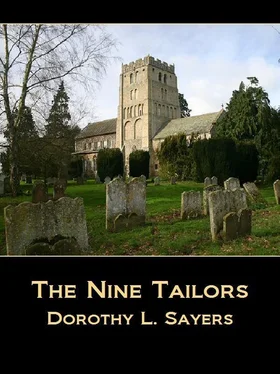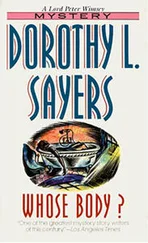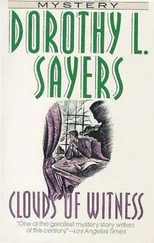Dorothy Sayers - The Nine Tailors
Здесь есть возможность читать онлайн «Dorothy Sayers - The Nine Tailors» весь текст электронной книги совершенно бесплатно (целиком полную версию без сокращений). В некоторых случаях можно слушать аудио, скачать через торрент в формате fb2 и присутствует краткое содержание. Жанр: Классический детектив, на английском языке. Описание произведения, (предисловие) а так же отзывы посетителей доступны на портале библиотеки ЛибКат.
- Название:The Nine Tailors
- Автор:
- Жанр:
- Год:неизвестен
- ISBN:нет данных
- Рейтинг книги:3 / 5. Голосов: 1
-
Избранное:Добавить в избранное
- Отзывы:
-
Ваша оценка:
- 60
- 1
- 2
- 3
- 4
- 5
The Nine Tailors: краткое содержание, описание и аннотация
Предлагаем к чтению аннотацию, описание, краткое содержание или предисловие (зависит от того, что написал сам автор книги «The Nine Tailors»). Если вы не нашли необходимую информацию о книге — напишите в комментариях, мы постараемся отыскать её.
The Nine Tailors — читать онлайн бесплатно полную книгу (весь текст) целиком
Ниже представлен текст книги, разбитый по страницам. Система сохранения места последней прочитанной страницы, позволяет с удобством читать онлайн бесплатно книгу «The Nine Tailors», без необходимости каждый раз заново искать на чём Вы остановились. Поставьте закладку, и сможете в любой момент перейти на страницу, на которой закончили чтение.
Интервал:
Закладка:
“Very good. Now Mrs. Wilbraham had a lady’s maid, and if it hadn’t been for her and Mary Thoday, the whole thing might have come to nothing. You’ll remember that Mary Thoday was Mary Deacon then. She was housemaid at the Red House, and she’d got married to Deacon at the end of 1913. Sir Charles was very kind to the young couple. He gave them a nice bedroom to themselves away from the other servants, just off a little back stair that runs up by the butler’s pantry, so that it was quite like a little private home for them. The plate was all kept in the pantry, of course, and it was supposed to be Deacon’s job to look after it.
“Now, this maid of Mrs. Wilbraham’s — Elsie Bryant was her name — was a quick, smart sort of girl, full of fun and high spirits, and it so happened that she’d found out what Mrs. Wilbraham did with her jewels when she was staying away from home. It seems the old girl wanted to be too clever by half. I think she must have been reading too many detective stories, if you ask me, but anyway, she got it into her head that the best place to keep valuables wasn’t a jewel case or a strong-box or anything of that kind, that would be the first thing a burglar would go for, but some fancy place where nobody would think of looking, and to cut a long story short, the spot she pitched upon was — if you’ll excuse me mentioning it — was underneath one of the bedroom utensils. You may well laugh — so did everybody in court, except the judge, and he happened to get a fit of coughing at the time and his handkerchief was over his face, so nobody could see how he took it. Well, this Elsie, she was a bit inquisitive, as girls are, and one day — not very long before the wedding — she managed to take a peep through a keyhole or something of that kind, and caught the old lady just in the act of putting the stuff away. Naturally, she couldn’t keep a thing like that to herself, and when she and her mistress got to Fenchurch — which they did a couple of days before the wedding — the first thing she had to do was to strike up a bosom friendship with Mary Deacon (as she was then) for the express purpose, as it seems to me, of telling her all about it in confidence. And of course, Mary, being a devoted wife and all that, had to share the joke with her husband. I dare say it’s natural. Anyhow, counsel for the defence made a big point of it, and there’s no doubt it was that utensil kept Elsie and Mary out of quod. ‘Gentlemen,’ he said to the jury, in his speech, ‘I see you all smiling over Mrs. Wilbraham’s novel idea of a safe-deposit, and I we no doubt you’re looking forward to passing the whole story on to your wives when you get home. And that being so, you can very well enter into the feelings of my client Mary Deacon and her friend, and see how — in the most innocent manner in the world — the secret was disclosed to the one man who might have been expected to keep it quiet.’ He was a clever lawyer, he was, and had the jury eating out of his hand by the time he’d done with them.
“Now we’ve got to guess again. There was a telegram sent off to Cranton from Leamholt — no doubt about that for we traced it. He said it came from Deacon, but Deacon said that if anybody sent it, it must have been Elsie Bryant. She and Deacon were both in Leamholt that afternoon, but we couldn’t get the girl at the post-office to recognise either of them, and the telegram was written in block letters. To my mind, that points to Deacon, because I doubt if the girl would have thought of such a thing, but needless to say, when the two of them were told to show a specimen of their printing, it wasn’t a mite like the writing on the form. Whichever of them it was, either they were pretty clever, or they got somebody else to do it for them.
“You say you’ve heard already about what happened that night. What you want to know is the stories Cranton and Deacon told about it. Here’s where Cranton, to my mind, shows up better than Deacon, unless he was very deep indeed. He told a perfectly consistent tale from start to finish. It was Deacon’s plan first and last. Cranton was to come down in a car and be under Mrs. Wilbraham’s window at the time mentioned in the telegram. Deacon would then throw out the emerald necklace, and Cranton would go straight off with it to London and get it broken up and sold, dividing the loot fifty-fifty with Deacon, less £350 he’d given him on account. Only he said that what came out of the window was only the jewel-case and not the emeralds, and he accused Deacon of taking the stuff himself and rousing the house on purpose to put the blame on him — on Cranton, that is. And of course, if that was Deacon’s plan, it was a very good one. He would get the stuff and the kudos as well.
“The trouble was, of course, that none of this came out till some time after Cranton had been arrested, so that when Deacon was taken and made his first statement to the police, he didn’t know what story he’d got to meet. The first account he gave was very straightforward and simple, and the only trouble about it was that it obviously wasn’t true. He said he woke up in the night and heard somebody moving about in the garden, and at once said to his wife: ‘I believe there’s somebody after the plate.’ Then, he said, he went downstairs, opened the back door and looked out, in time to see somebody on the terrace under Mrs. Wilbraham’s window. Then (according to him) he rushed back indoors and upstairs, just quick enough to catch a fellow making off through Mrs. Wilbraham’s window.”
“Hadn’t Mrs. Wilbraham locked her door?”
“No. She never did, on principle — afraid of fire, or something. He said he shouted loudly to alarm the house, and then the old lady woke up and saw him at the window. In the meantime the thief had climbed down by the ivy and got away. So he rushed off downstairs and found the footman just coming out of the back door. There was a bit of confusion about the back door part of the story, because Deacon didn’t explain, first go-off, how he happened to be in Mrs. Wilbraham’s bedroom at all. His very first tale, to Sir Charles, had been that he went straight out when he heard the noise in the garden, but by the time the police got him, he’d managed to fit the two accounts together, and said that he’d either been too upset at the time to explain himself clearly or else that everybody else had been too upset to understand what he said. Well, that was all right, until they started to unearth all the history of his having met Cranton before, and the telegram and so on. Then Cranton, seeing that the game was up, told his tale in full, and of course, that made it pretty awkward for Deacon. He couldn’t deny it altogether, so he now admitted knowing Cranton, but said it was Cranton who had tried to tempt him into stealing the emeralds, while he had been perfectly sea-green incorruptible. As for the telegram, he denied that altogether, and put it on Elsie. And he denied the £50 altogether, and it’s a fact that they never traced it to him.
“Of course, they cross-examined him pretty fiercely. They wanted to know, first, why he hadn’t warned Sir Charles about Cranton and secondly, why he’d told a different tale at first. He declared that he thought Cranton had given up all idea of the theft, and he didn’t want to frighten anybody; but that when he heard noises in the garden, he guessed what was happening. He also said that afterwards he was afraid to own up to knowing Cranton for fear he should be accused of complicity. But it sounded a pretty thin story, and neither the judge nor the jury believed a word of it. Lord Bramhill spoke very severely to him after the verdict, and said that if it hadn’t been his first offence, he’d have given him the heaviest sentence it was in his power to bestow. He called it aggravated larceny of the very worst type, being committed by a servant in a position of trust, in a dwelling-house and his master’s dwelling-house at that, and accompanied by the opening of a window, which made it into burglary, and then he had violently resisted arrest, and so forth and so on; and in the end he gave Deacon eight years’ penal servitude and told him he was lucky to get off with that. Cranton was an old offender and might have got a lot more, but the judge said he was unwilling to punish him much more heavily than Deacon, and gave him ten years. So that was that. Cranton went to Dartmoor, and served his full time as a perfectly good old lag, without giving much trouble to anybody. Deacon, being a first offender, went to Maidstone, where he set up to be one of those model prisoners — which is a kind you always want to look out for, because they are always up to some mischief or other. After nearly four years — early in 1918, it was — this nice, refined, well-conducted convict made a brutal attack on a warder and broke prison. The warder died, and of course the whole place was scoured for Deacon, without any success. I daresay, what with the War and one thing and another, they hadn’t as many men to carry on the job as they ought to have had. Anyhow, they didn’t find him, and for two years he enjoyed the reputation of being about the only man who had ever broken prison successfully. Then his bones turned up in one of those holes — dene-holes, I think they call them, in a wood in North Kent so they found it was one up to the prison system after all He was still in his convict clothes and his skull was all smashed in, so he must have tumbled over during the night — probably within a day or two of his escape. And that was the end of him.”
Читать дальшеИнтервал:
Закладка:
Похожие книги на «The Nine Tailors»
Представляем Вашему вниманию похожие книги на «The Nine Tailors» списком для выбора. Мы отобрали схожую по названию и смыслу литературу в надежде предоставить читателям больше вариантов отыскать новые, интересные, ещё непрочитанные произведения.
Обсуждение, отзывы о книге «The Nine Tailors» и просто собственные мнения читателей. Оставьте ваши комментарии, напишите, что Вы думаете о произведении, его смысле или главных героях. Укажите что конкретно понравилось, а что нет, и почему Вы так считаете.












